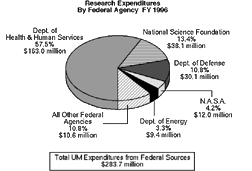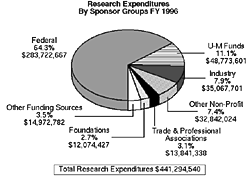The University Record, May 20, 1997
U must continuously tell Congress and the public of the importance of federal research investment
By Jane R. Elgass
A recent survey by R&D Magazine says that more than 80 percent of the respondents—researchers in industry, academe and government—think that America will lose its competitive edge in industry within 25 years unless basic research funding is increased.
 That finding lent further importance to recent meetings in Washington, D.C., of the research officers and government relations officers of the Big Ten schools with government administrators and members of the House of Representatives.
That finding lent further importance to recent meetings in Washington, D.C., of the research officers and government relations officers of the Big Ten schools with government administrators and members of the House of Representatives.
The meetings were designed to present the magnitude of Big 10 research endeavors, and express deep interest in the new balanced budget agreement that respects the need for the federal government to maintain an investment in basic research.
According to Frederick Neidhardt, acting vice president for research who attended the meetings, there’s good news coming out of Washington—agreement on a balanced budget—and not-so-good news—lack of understanding among many of the need to support basic research.
“There’s all kinds of good news—both parties are talking, they are willing to compromise, there is agreement on a budget and it’s unlikely there will be an interruption in government such as that of two years ago.”
Neidhardt says the National Institutes of Health (NIH) “enjoys great support, with Congress recognizing that the public looks with favor on medical research,” and he expects strong funding, in the range of 6-9 percent, to continue. He also notes that the National Science Foundation can expect increases that at least match inflation and possibly more. “This shows that Congress is sympathetic to basic research,” he adds.
 Sixty-five percent of the U-M’s research budget comes from the federal government. The largest portion of those dollars—one-third—comes from NIH.
Sixty-five percent of the U-M’s research budget comes from the federal government. The largest portion of those dollars—one-third—comes from NIH.
Neidhardt also is encouraged by the pending National Research Investment Act, sponsored by Sens. Phil Gramm (R-Texas), Connie Mack (R-Florida), and Kay Bailey Hutchison (R-Texas) that calls for doubling the funding of non-defense basic research over the next 10 years.
And he notes that the House Science Committee has asked its vice chair Vernon J. Ehlers (R-Grand Rapids) to draft a National Research Policy Statement that would define the role of the federal government in basic research.
On the bad news side, the budget agreement is still in the “bare bones” stage, with no details worked out on the cuts to be made.
“The United States is on a collision course, two trains heading for each other.” One is the increase in entitlement expenditures (Social Security, Medicare and interest on the national debt), which “captures an increasingly astonishing fraction of the federal budget,” Neidhardt explains.
The other train is the desire to balance the federal budget without raising taxes.
“The nation wants a balanced budget,” Neidhardt says, “and something has to give. Everyone who studies the situation has fears about continued investment in basic science.
“The nation must figure out the importance of research and the role universities play in generating knowledge. Universities have to sell themselves to the public, not just Congress,” he says.
He also notes that much of the public doesn’t understand how knowledge is generated, whether it be by national laboratories, industry R&D or universities.
“The American people need to recognize that the R&D dollars spent by industry focus chiefly on applied, problem-driven research. Basic research, that driven by curiosity that generates knowledge about the world, is largely performed in universities. We need both kinds.”
Neidhardt says that in the next few years the Big 10 schools will be using “every tool at their disposal” to convince the public of the importance of research funding, at the same time “telling our story as often as possible to members of Congress.”
“We’ve got wide-open arms, and open doors. We’re willing to do anything people ask of us.”

